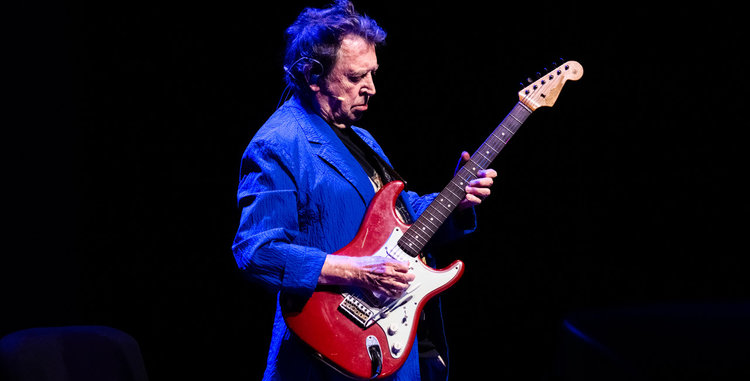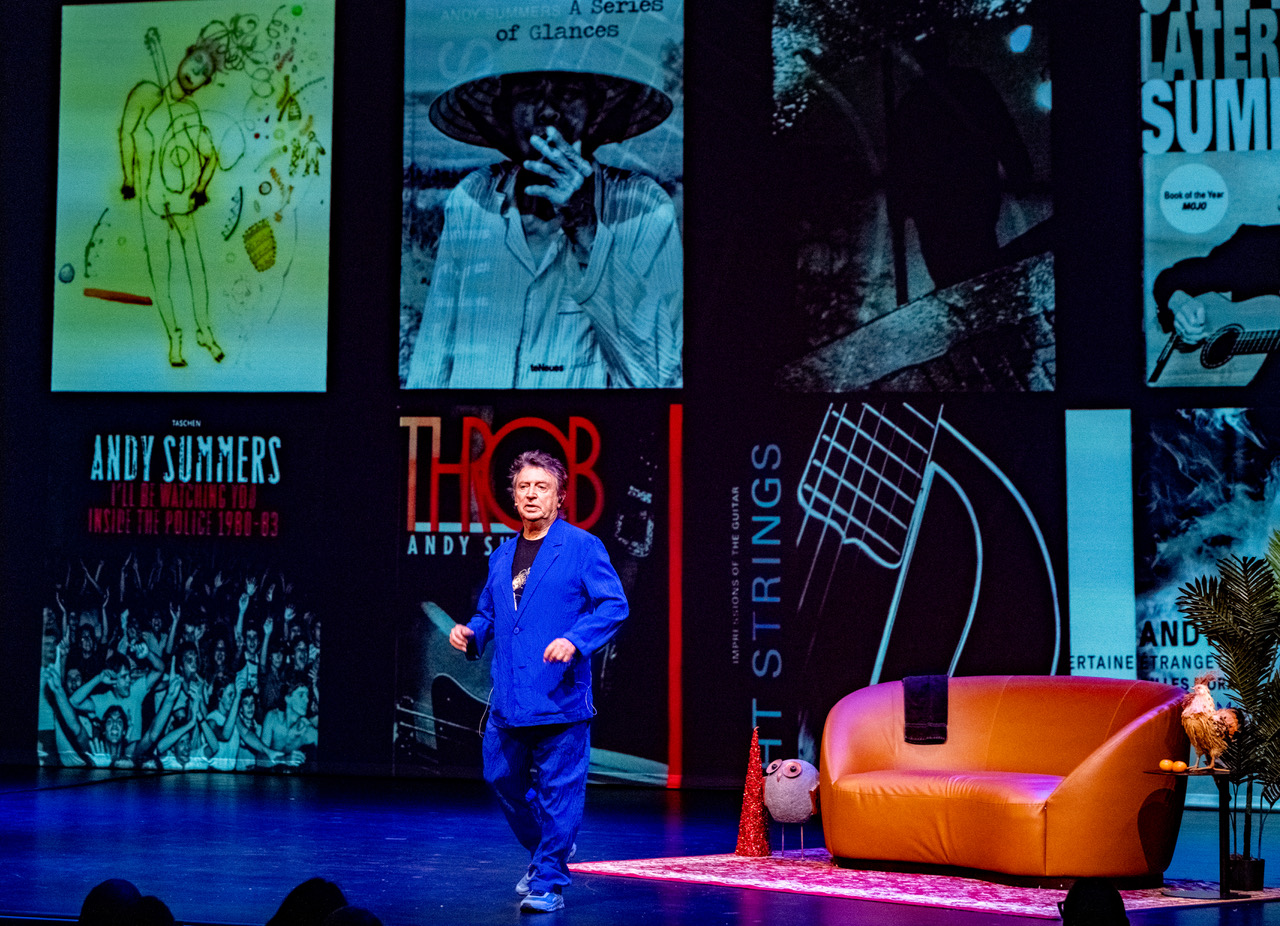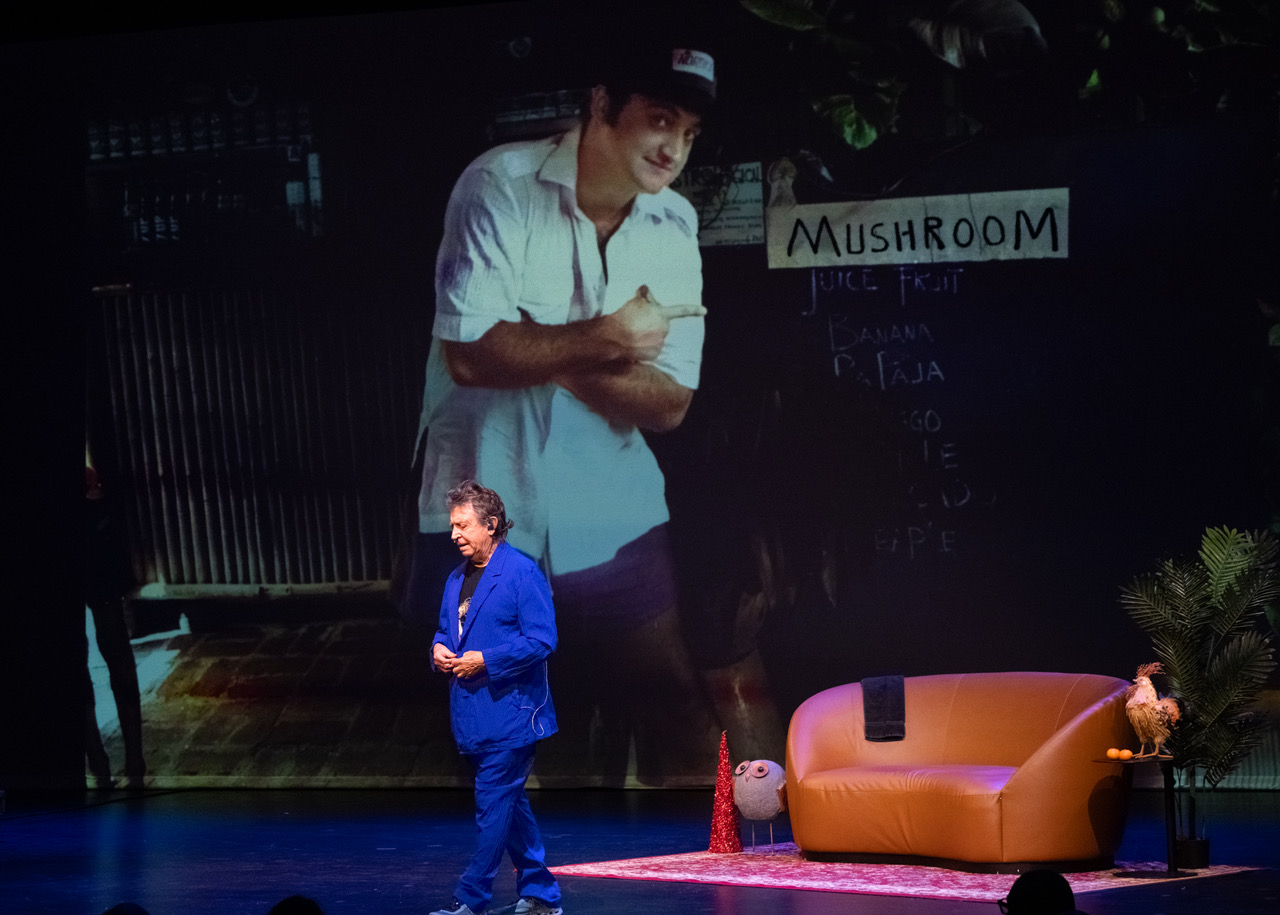Andy Summers
The Presidio
September 27, 2025
Photos by Steve Roby
The Police’s guitarist returned to San Francisco with a compact, cinematic solo show—loop-driven guitar, road stories, and morphing photographs—ending in a sing-along built for nostalgia and tone-chasers alike.
The lobby buzzed before the doors even opened—vintage Police tees, a Guitar Player table, stacks of Summers’ photo books, and six different T-shirts at the merch stand. One fan in sequins clutched a bouquet; another asked an usher, “What time does the music start?” Inside, the stage looked half living room, half screening room: leather couch, small table, a lone plant, amps ready to go. In other words, not an arena—by design.
When the lights dropped, Andy Summers stepped into a two-hour blend of music and memoir that suited a 600-seat room. He stood center stage with his images blooming and dissolving behind him, then occasionally reclined on the couch to watch short films—his past reflected in grain and shadow. He no longer reads from his fiction in these shows; instead, he talks off the cuff and lets the guitar and images carry the narrative. “People seem to pay pretty rapt attention… I play a couple of Police songs at the end of the show. It’s the climax!”
For guitar enthusiasts, the signal path is a defining characteristic, and Summers made it a key element. Playing a red Fender into a board of modern and classic stompboxes—modulation, delays, even synth flavors—he built the harmonic halos that defined his Police years, then steered them toward chamber-sized cinematics. The parts locked to prerecorded bass and drums, but the touch stayed human: chiming harmonics, chorus that swelled and receded, echoes timed to the images on screen. The tonecraft wasn’t just nostalgic; it was a living demonstration of how effects can orchestrate harmony and space without crowding a melody.
The stories threaded it all together. Early on, Summers recounted a gig in Buenos Aires during a tense political moment. A 16-year-old fan, “tears streaming down her face,” was yanked by a baton-wielding cop at the lip of the stage; a plainclothes official later warned the band’s manager he might not be allowed back. The anecdote lands heavier in a theater than it would in a stadium: the distance between the stage and the audience shrinks, and what might once have been tour lore feels like a witness.
Just as quickly, he pivoted to cinema. Summers spoke about escaping into arthouse films as a kid, and he singled out Black Orpheus. “I was deeply moved by it… Luiz Bonfá… ‘Manhã de Carnaval.’ And I will play that for you now.” He did, letting the bossa sway meet his liquid voicings, a reminder that his guitar language—modal color, suspended chords, upper-structure tension—owes as much to film mood and Brazilian lyricism as to rock radio.
The night’s comic high point came via a Bali caper co-starring John Belushi: a mushroom-fueled Jeep mission through tropical rain, a soccer match interruption, and a near-rescue by a truck labeled “Tarzan.” Summers folded it into his catalog with a wink, tying the tale to “Triboluminescence.” It’s the sort of story that could veer shaggy, but here it functioned as a process—how chaos, travel, and chance encounters mutate into music.
Another travel vignette—his Brazil misadventure—sketched a more surreal edge: the missed flight, the 2AM disorientation, even a doctor who dramatically declared he had “20 minutes to live,” later becoming the song “The Last Dance of Mr. X.” In Summers’ telling, the punchlines never strain for effect; he trusts the oddness of memory, then uses the next piece to show what the experience sounds like.
Between stories, the setlist traced his solo work and the Police songbook. For the instrumentals, he favored patient builds over flash—melodic hooks sitting inside wide intervals, repeats that morphed rather than looped. For the Police material, he leaned into texture rather than reenactment: “Roxanne” arrived with the famous syncopated stabs reshaped for a single guitar and track; “Spirits in the Material World” maintained its minor-key lift; “Every Breath You Take” landed as a study in right-hand consistency and chorus shimmer. A short film of Summers ambushing a karaoke bar in Japan with “Every Breath” underscored the point: these songs are now part of the culture, not just the catalog.
The visuals augmented rather than distracted. He’s said the show runs “eight or nine” carefully sequenced pieces where the guitar scores the images—“like the pianist playing to the movie” in the silent era—and at the Presidio, that concept clicked. The photos didn’t sit; they slid, morphed, and cross-faded, turning voicings into edits and delays into cuts. In a bigger room, the nuance would flatten; here, you could actually hear the frames.
Audience response was closely tied to the set’s design. The biggest roars met “Roxanne,” “Spirits in the Material World,” and “Message in a Bottle,” the encore that turned the orchestra section into a gentle sing-along. One Deadhead-adjacent dancer spun near his seat all night; when the bouquet from the third row finally reached the stage, Summers looked genuinely touched. For a show marketed as multimedia, its core felt simple: a musician speaking directly, then proving each point with his hands.
If there’s a thesis, Summers stated it plainly in conversation about this tour: “I’m the thing that ties it all together—my sensibility, my guitar playing, the way I play the guitar.” At the Presidio, that sensibility—curious, dry-humored, precise—held. For Police fans, the hits offered closure without the need for cosplay. For guitar players, the lesson was practical: build a palette, orchestrate with effects, let the part, not the pedal, be the hook. And for everyone else, the take-home was in the pacing—how a veteran can make a theater feel like a memory developing in a darkroom, each image surfacing just long enough to become a song.
Setlist: “True Nature,” “Metal Dog,” “Bones of Chuang Tzu,” “The Last Dance of Mr. X,” “Tea in the Sahara,” “’Round Midnight,” “Roxanne,” “Manhã de Carnaval,” “Menina Flor,” “Triboluminescence,” “Spirits in the Material World,” “Every Breath You Take,” “Bring On The Night.” Encore: “Message in a Bottle.”




